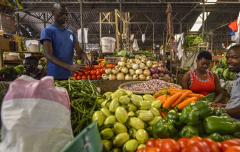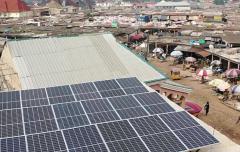“Taking a nexus approach can create synergies across the Sustainable Development Goals”: Partner spotlight interview with Elizabeth Cousens, Deputy CEO of UN Foundation
In an interview with Elizabeth Cousens, Deputy Chief Executive Officer, UN Foundation, we discuss their work on SDG 7, how energy access is crucial to social services like health care and how they’re supporting the distributed clean energy sector.
What is the UN Foundation’s mission?
The UN Foundation was created to support the UN and UN causes to tackle some of the most pressing issues of our time. We help build strategic coalitions and partnerships to link the UN’s work with others around the world, mobilizing the energy and expertise of business, science, media, and non-governmental organizations to help the UN meet major global challenges, including energy access and climate change, global health, and girls’ and women's rights and empowerment. We do this by drawing upon a diverse set of capabilities – channeling resources, convening conversations, championing action, communicating to diverse constituencies, and collaborating around practical solutions.
How does the UN Foundation support Sustainable Development Goal 7?
Since our founding, the UN Foundation has championed clean and sustainable energy solutions for all. We were early supporters of a comprehensive approach to energy that connected an ambitious agenda for energy access with promotion of sustainable and efficient energy solutions. Over the years, we contributed to building the diverse base of support for what eventually became SDG 7 and have led several pioneering initiatives to support new ways to expand energy access and ensure that the energy needs of the most vulnerable and hardest to reach people are met.
Today, our energy access work focuses on tackling barriers to scaled development and deployment of the distributed clean energy technologies that offer an increasingly affordable and sustainable way to close the energy access gap. This includes initiatives such as the Energy Access Practitioner Network and the Mini-Grids Partnership, which help unify and coordinate the distributed clean energy sector, accelerate learning and action, broker partnerships, and advocate for change. The UN Foundation also hosts the Global Alliance for Clean Cookstoves, which is a public-private partnership to save lives, improve livelihoods, empower women, and combat climate change by creating a thriving global market for clean and efficient cooking solutions.
We also see our energy work in the context of the Sustainable Development Goals and, as in other areas of the Foundation, seek to elevate initiatives that have multiple impacts across that agenda. This is why we complement our work on distributed clean energy with an initiative on Powering Health Care and through our work promoting Safe Access to Fuel and Energy, both of which help address the vital energy needs of vulnerable and hard-to-reach populations. We also support efforts to strengthen tracking and accountability mechanisms such as the High-level Political Forum which, of course, is assessing progress toward SDG 7 this year.
What does your partnership with SEforALL focus on?
We have been supporting Sustainable Energy for All since its inception in 2011, through to its emergence as a global leader in the energy access space. I am proud to serve as the vice chair on the board of SEforALL. At the UN Foundation, we help channel and connect industry and civil society input on energy access issues through the Energy Access Practitioner Network – now counting 2,500 members collectively representing 1,350 organizations. Two of our other initiatives – the Mini-Grids Partnership and Powering Health Care – initially started as High-Impact Opportunities under SEforALL, and are conceived as strategic initiatives to further advance our common goal of providing modern, affordable energy access to those who need it most. Most recently, we contributed to SEforALL’s People-Centered Accelerator, leveraging the collective experience of our networks.
What do you see as a key and underserved area in energy access right now, and how are you addressing it?
While much of the attention in the ongoing response to energy poverty has focused on household energy, less attention has been paid to energy in social services, such as health care.
Health care facilities depend on electricity to function and provide essential services when and where they are needed most: Electricity is needed to power the lights in the operating and delivery rooms, it’s needed to maintain the cold chain for vaccines, and it’s needed to operate medical devices. However, even today, it’s estimated that tens of thousands of health facilities across Sub-Saharan Africa and South Asia still lack access to electricity or suffer from frequent and debilitating blackouts. Indeed, one of the chief barriers to Universal Health Coverage lies in gaps in energy infrastructure for health care facilities.
Our Powering Health Care initiative works with the UN and partners to advance access to power in health facilities in resource-constrained settings, so that we can improve the availability and quality of primary health services, especially for women and children. This is a great example of how taking a nexus approach can create synergies across the Sustainable Development Goals.
2018 is a busy year for sustainable energy. What is the UN Foundation looking forward to?
In just a few months, we will join colleagues from across the energy sector at the upcoming SEforALL Forum in Lisbon. We will be launching a new Distributed Energy Market Trends and Analysis report, drawing on the latest of a series of surveys the UN Foundation conducts of its Energy Access Practitioner Network that generate market intelligence about the state of the global distributed energy access sector. The UN Foundation also plans on participating in several of the Forum’s thematic discussions around energy and health and mini-grids. Also, after a year of implementation and laying the groundwork for in-depth research on the health-energy nexus, we will be sharing many more stories and data about how energy access impacts human lives as we move to elevate the nexus of health and energy.
We see the July High-level Political Forum as a critical opportunity for countries to take stock of progress on SDG 7 and shape the forward agenda. Additionally, as a Steering Committee member of the Safe Access to Fuels and Energy working group, which looks at the intersection of energy in humanitarian settings, we are proud to be contributing to the development of a ‘Global Plan of Action for Sustainable Energy Solutions in Situations of Displacement’, in partnership with many other stakeholders. This really feels like a pivotal year for the sector, and we are proud to continue our contribution to advancing the SDG7 agenda.
Elizabeth Cousens is Deputy Chief Executive Officer of the UN Foundation. Follow her on Twitter at @e_cousens



